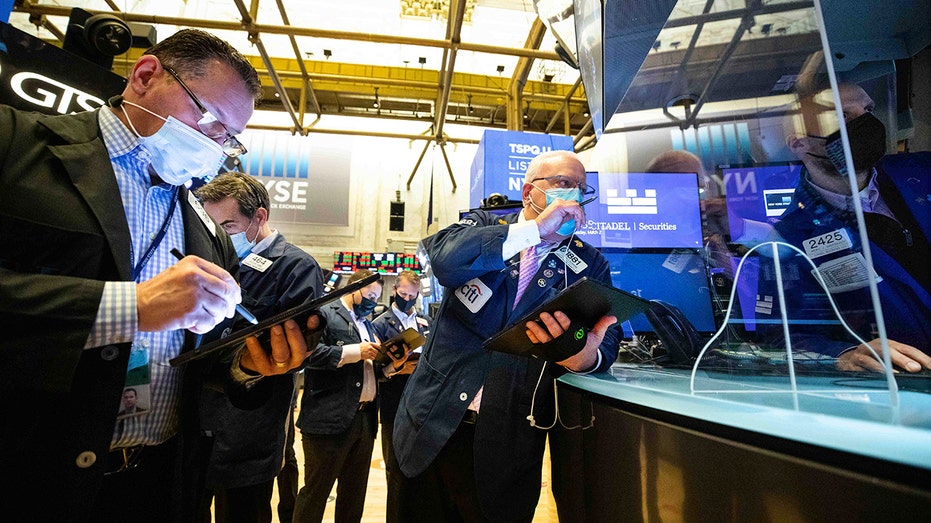US stocks mixed as Fed moves to restore big bank's capital requirements
However, most of the Fed's policies aimed at supporting COVID recovery remain intact
U.S. equity futures are trading mixed early Monday hours before the opening bell on Wall Street.
| Ticker | Security | Last | Change | Change % |
|---|---|---|---|---|
| I:DJI | DOW JONES AVERAGES | 50135.87 | +20.20 | +0.04% |
| SP500 | S&P 500 | 6964.82 | +32.52 | +0.47% |
| I:COMP | NASDAQ COMPOSITE INDEX | 23238.66991 | +207.46 | +0.90% |
Last week's Fed moves will restore some of the capital requirements for big banks that were suspended in the early months of the viral outbreak, in order to give banks flexibility. The banking industry had hoped those measures would be extended.
But most of the Fed's policies aimed at supporting the recovery from the pandemic remain intact.
OIL GIANT SAUDI ARAMCO SEES 2020 PROFITS DROP TO $49 BILLION
Worries about the coronavirus pandemic remain in the region, where vaccine rollouts in some nations such as Japan and Thailand are progressing slowly compared to the U.S. or Europe. Nonetheless, in Japan a “state of emergency” is being lifted this week in the Tokyo area,
Wall Street had closed out last week mostly lower, with all benchmarks finishing in the red for the week. The S&P 500 lost 0.1% to 3,913.10. The Dow Jones Industrial Average fell 0.7% to 32,627.97, pulled lower by financial companies. The technology-heavy Nasdaq Composite rose 0.8%, to 13,215.24.

U.S. equity futures are trading mixed early Monday hours before the opening bell on Wall Street. (Colin Ziemer/New York Stock Exchange via AP)
The Russell 2000 index of smaller companies clawed back some of its losses from a day earlier, gaining 0.9% to 2,287.55.
As interest rates have risen, pricier stocks like technology companies have fallen. The prospect of higher interest rates as bond yields rise has some investors concerned that economic growth could slow. There are also concerns that the rise in bond yields could be a harbinger of inflation.
Meanwhile, Asian shares were mixed Monday as sentiment was shaken by the U.S. Federal Reserve's announcement that it would end some emergency measures put in place last year to help the financial industry deal with the pandemic.
ELON MUSK MAKES LIGHT OF NFT INVESTORS ON TWITTER
In Asian trading, Japan's benchmark Nikkei 225 dropped 2.1% in afternoon trading to 29,174.15. South Korea's Kospi lost 0.1% to 3,035.46. Australia's S&P/ASX 200 gained 0.7% to 6,752.50. Hong Kong's Hang Seng shed 0.2% to 29,941.21, while the Shanghai Composite jumped 1.1% to 3,443.44.
Major Japanese stocks fell nearly across the board, including automakers like Toyota Motor Corp. and Honda Motor Co., whose earnings get a boost from a healthy U.S. economy. Toyota's shares fell 3.3% while Honda's lost 3.6%.
“Asia markets had seen a mixed commencement to the week with the rising bond yields once again weighing on sentiment. The see-sawing of the influence between rising bond yields and improving economic recovery prospect may well remain for the region going into the end of March,” said Jingyi Pan, senior market strategist at IG in Singapore.
The Turkish lira nosedived early Monday, falling about 17%, after the country's president, Recep Tayyip Erdogan, removed central bank head Naci Agbal from his post on Saturday. The currency was trading at about 7.8 lira to the dollar on Monday morning.
Agbal had been struggling to counter inflation by raising interest rates, while Erdogan contended that raising interest rates would contribute to inflation — contrary to economic experience and theory, Jeffrey Halley of Oanda said in a commentary. He replaced Agbal with a banking professor who has argued for lower interest rates.
CLICK HERE TO READ MORE ON FOX BUSINESS
The central bank had said tight monetary policy would be maintained until inflation, which has hit 15.61% was brought under control. An increase in the key interest rate by 200 basis points to 19% last week had pushed the lira higher.
“Turkey will be an interesting example of what emerging markets can expect if inflation fears rise markedly," Halley said.
In energy trading, benchmark U.S. crude fell 86 cents to $60.58 a barrel in electronic trading on the New York Mercantile Exchange. It gained $1.38 to $61.44 per barrel on Friday. Brent crude, the international standard lost 14 cents to $64.39 a barrel.
In currency trading, the U.S. dollar inched up to 108.80 Japanese yen from 108.65 yen. The euro cost $1.1892, up from $1.1880.




















